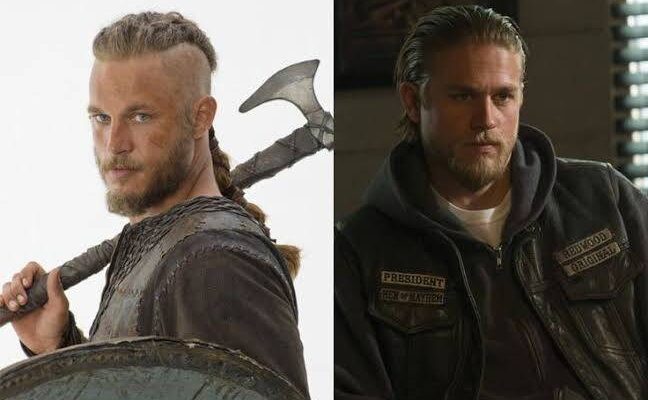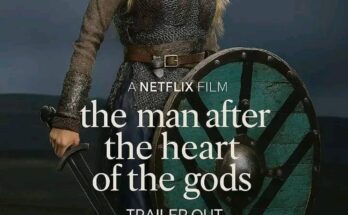Charlie Hunnam vs. Travis Fimmel: A Story of Two Stars Who Revolutionized TV Stardom
Television has always been a medium that produces stars, but few actors in recent memory have had the cultural impact of Charlie Hunnam and Travis Fimmel. Their names are etched into the modern TV canon because of two unforgettable roles—Hunnam as Jax Teller in Sons of Anarchy and Fimmel as Ragnar Lothbrok in Vikings. These two characters not only defined their respective series but also redefined what television antiheroes could be, blending raw charisma, vulnerability, and ruthless ambition in ways that left audiences around the world captivated. The story of these two actors is not merely one of individual talent but also a reflection of how television has evolved into a platform capable of producing legends equal to, if not greater than, film.
Charlie Hunnam entered the cultural spotlight in 2008 with the premiere of Sons of Anarchy, a gritty FX drama about outlaw bikers navigating power struggles, loyalty, and betrayal. As Jax Teller, Hunnam embodied the archetypal antihero—a man torn between the violent criminal legacy of his motorcycle club and his yearning for a better life for his family. What made Jax compelling was not just his charisma or his dangerous edge but his constant moral conflict. Hunnam gave the role a depth that elevated the show beyond typical crime drama, turning Sons of Anarchy into a cultural phenomenon that ran for seven intense seasons.
On the other side of the television landscape, Travis Fimmel was preparing to make history of his own. In 2013, he stepped into the role of Ragnar Lothbrok in Vikings, a series that combined brutal battle scenes with rich Norse mythology. Ragnar was not just a warrior but also a dreamer, a farmer who sought to explore and conquer lands beyond the known horizon. Fimmel’s performance was magnetic—quirky, unpredictable, and emotionally charged. Much like Hunnam’s Jax, Ragnar was both hero and villain, capable of immense love and devastating cruelty. It was this complexity that made the character unforgettable and helped catapult Vikings into the realm of global success.
What makes the comparison between Hunnam and Fimmel fascinating is how their careers mirror each other in many ways. Both men anchored long-running series that relied heavily on their performances to keep audiences invested. Both played characters who straddled the line between morality and brutality, embodying the contradictions of men shaped by violence yet yearning for meaning. And both became synonymous with their roles to the point where fans often struggle to separate the actor from the character.
Yet, despite these similarities, their paths to stardom were strikingly different. Hunnam, born in Newcastle, England, had been acting since his teens, appearing in British series such as Byker Grove and Queer as Folk before transitioning to Hollywood. His early career was filled with promise but lacked that breakout role until Sons of Anarchy. Once he found Jax Teller, everything changed. Hunnam became not just a star but a cultural icon, the face of a generation of TV antiheroes who blurred the line between good and evil.
Fimmel’s story, by contrast, is almost mythological in itself. Growing up on a dairy farm in rural Australia, he was discovered by a modeling scout and initially pursued a career in fashion before turning reluctantly toward acting. For years, he struggled to find roles that fit his unconventional style. That all changed when Michael Hirst, the creator of Vikings, cast him as Ragnar. Fimmel’s unpredictable, improvisational approach to acting brought the character to life in ways few could have anticipated. He transformed Ragnar into a figure that felt both historically grounded and deeply human, elevating the entire series with his presence.
Another key similarity lies in how both actors transformed their shows into cultural touchstones. Sons of Anarchy resonated with audiences not just because of its action-packed storytelling but because Hunnam made viewers care deeply about Jax’s inner turmoil. His struggle to escape the cycle of violence and protect his family mirrored universal themes of loyalty, identity, and legacy. Meanwhile, Vikings became a global sensation largely because of Fimmel’s Ragnar, who embodied the eternal human desire to explore, conquer, and defy destiny. His mix of charm, menace, and humor gave the series a depth that attracted audiences far beyond traditional fans of historical dramas.
Both performances also highlight a broader shift in television: the rise of the antihero as a dominant figure. Prior to the 2000s, television heroes were often clean-cut, morally upright figures. But shows like The Sopranos, Breaking Bad, and later Sons of Anarchy and Vikings pushed audiences to embrace flawed protagonists. Jax and Ragnar were not admirable in a traditional sense—they committed violence, betrayed allies, and made devastating mistakes—but they were compelling because they reflected the contradictions of human nature. Hunnam and Fimmel each revolutionized TV stardom by proving that audiences were hungry for characters who existed in shades of gray.
Off-screen, both actors share a certain reluctance toward fame. Hunnam has often spoken about his desire for privacy and his discomfort with celebrity culture, while Fimmel is famously low-key, often avoiding Hollywood altogether in favor of a quiet life in Australia. This authenticity only adds to their appeal, as fans sense that these actors are more focused on the craft than on the trappings of stardom.
Of course, their careers have diverged since leaving their respective shows. Hunnam transitioned into film, appearing in projects such as Pacific Rim, The Lost City of Z, and Guy Ritchie’s King Arthur: Legend of the Sword. While not every film was a critical or commercial success, his performances consistently showcased the charisma that made him a household name. Fimmel, meanwhile, has taken on a variety of roles, from Ridley Scott’s sci-fi series Raised by Wolves to historical epics like Warcraft. Though his choices have often been unconventional, they reflect a willingness to experiment rather than follow the safe path of Hollywood stardom.
The legacies of Jax Teller and Ragnar Lothbrok continue to shape television even after the shows have ended. Fans still debate the choices these characters made, the morality of their decisions, and the tragic arcs that defined them. Both Hunnam and Fimmel left their series at pivotal moments, ensuring that their exits were as unforgettable as their entrances. This sense of closure, combined with their undeniable impact, has cemented both men as legends of modern TV.
Ultimately, comparing Charlie Hunnam and Travis Fimmel is not about deciding who was “better” but about recognizing how both transformed television in their own ways. Hunnam gave us the outlaw biker with a conscience, a man caught between loyalty and morality. Fimmel gave us the farmer-turned-king whose curiosity reshaped history. Both characters embodied the contradictions of the human spirit, and both actors elevated their shows into cultural landmarks.
In the end, Charlie Hunnam and Travis Fimmel represent a new kind of television stardom—one rooted not in glamour or traditional heroism but in authenticity, complexity, and a willingness to embrace the darker sides of humanity. Their careers remind us that the small screen can produce stories as grand, tragic, and transformative as anything found in film, and that sometimes, it is television that gives us the most unforgettable heroes and antiheroes of all.



